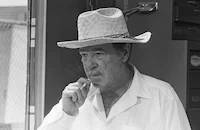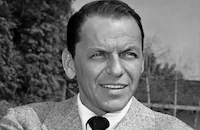The Detective

Brief Synopsis
Cast & Crew
Gordon Douglas
Frank Sinatra
Lee Remick
Jacqueline Bisset
Ralph Meeker
Jack Klugman
Film Details
Technical Specs

Synopsis
New York City Detective Joe Leland is assigned to investigate the grisly murder of Teddy Leikman, the homosexual son of a politically influential department store owner. Aware that a quick arrest and conviction will further his chances of promotion, Leland brings in the dead man's psychopathic former roommate, Felix Tesla, and succeeds in extracting a confession from him. After witnessing Tesla's death by execution and receiving a promotion, Leland makes a futile attempt to patch up his marriage to Karen. A short time later, he receives a visit from Norma MacIver, the wealthy widow of an accountant who fell to his death from the grandstand roof of a race track. Certain that her husband was murdered, Norma explains to Leland that all her efforts to investigate the death have been thwarted. In attempting to reopen the case, Leland encounters strong police opposition, particularly from a fellow officer, Lieutenant Curran, who hints that certain people would be willing to pay a large sum of money if the case remained closed. Following an attempt on his life, Leland examines MacIver's files and discovers that the accountant was involved with several members of the Borough Planning Commission in corrupt land speculation. Suspecting that MacIver's psychiatrist neighbor, Dr. Wendell Roberts, is concealing evidence, Leland breaks into his office. When Roberts unexpectedly comes in, Leland forces him to play a tape recording of one of MacIver's visits. The recording reveals not only MacIver's bisexuality but the fact that after being picked up at a bar by Leikman, his detestation of homosexuality caused him to commit the murder and then take his own life. Realizing that as a police officer he has been instrumental in sending an innocent man to his death, Leland removes his badge and decides to devote himself to exposing police and government corruption.

Director

Gordon Douglas
Cast

Frank Sinatra

Lee Remick

Jacqueline Bisset

Ralph Meeker

Jack Klugman
Horace Mcmahon

Lloyd Bochner

William Windom
Tony Musante
Al Freeman Jr.

Robert Duvall
Patrick Mcvey
Dixie Marquis
Sugar Ray Robinson
Renee Taylor
James Inman
Tom Atkins
James Dukas
Sharon Henesy
Jan Farrand
Marion Brash
Earl Montgomery
Peg Murray
Frank Reiter
Peter York
Mark Dawson
José Rodriguez
Tom Gorman
Lou Nelson
Richard Krisher
Jilly Rizzo
Arnold Soboloff
George Plimpton
Phil Sterling
Don Fellows
Paul Larson
Ted Beniades
Crew
L. B. Abbott
Warren Barker
Joseph Biroc
Layne Britton
William Creber
Art Cruickshank
David Dockendorf
Jerry Goldsmith
Richard Lang
Harry M. Lindgren
Edith Lindon
Moss Mabry
Abby Mann
Aaron Rosenberg
Arthur E., (lieut.) Schultheiss
Walter M. Scott
David Silver
Robert Simpson
Jack Martin Smith
Dan Striepeke
Jerry Wunderlich

Videos
Movie Clip



Film Details
Technical Specs

Articles
George Plimpton, 1927-2003

George Plimpton, 1927-2003
The Detective (1968)
The movie begins with detective Joe Leland (Frank Sinatra) investigating a grisly murder, one in which the victim's skull has been crushed in and the body mutilated. They don't have any good leads except the victim's roommate, Felix (Tony Musante), a man currently missing, perhaps because he's a murderer on the run. When they catch up with him, Leland rends a confession from him but it's not exactly the most reliable confession ever given. In fact, he seems mentally off to the point that any suggestion of any crime might illicit an affirmation of guilt. It's not until a suicide occurs some time later that Joe Leland begins to believe, and eventually discover, there's a lot more going on than he previously knew and following it through to the end will mean taking on the very system of which he's a part.
Sinatra had worked with director Gordon Douglas before, on Robin and the 7 Hoods (1964) and Tony Rome (1967), made just before The Detective (and with Lady in Cement [1968] coming right after, Sinatra and Douglas made three consecutive movies), and obviously felt comfortable with him. This was important as Sinatra would be in movie situations that were still considered racy for the time. The language was more profane, the violence more pronounced, and sexuality was a central theme. True, by today's standards, the movie's view of homosexuality seems dated and unenlightened, but at the time it was a risky step for a star like Sinatra to even star in a movie that treated such formerly taboo themes with a previously unknown level of openness. It was also important to the writer, Abby Mann.
Abby Mann had made his fame winning an Oscar for the Stanley Kramer classic, Judgment at Nuremberg (1961). Mann was known to wear his heart on his sleeve and when given a worldwide audience as a winner at the Academy Awards, he remarked, "A writer worth his salt at all has an obligation not only to entertain but to comment on the world in which he lives." Commenting on the world was something that Mann sought to do in everything he wrote, even the countless television dramas he wrote week in and week out. When given the chance to adapt Roderick Thorp's police procedural novel into a movie, he used the screenplay as a platform to express his own worldviews through the mouth of detective Joe Leland. Detective Leland comments on youth culture, gay culture, and the general sense of disenfranchisement so thickly felt in the air in 1968, and all in an understanding, open-minded, socially progressive way. It was fine with Sinatra, a lifelong liberal who wanted to be seen as understanding the world of 1968 that many of his generation could not hold claim to. As rock and roll became the music of choice for a younger generation, Sinatra didn't want to see himself shuffled to the sidelines as an out of touch old man and using his clout as an actor to make tough, adult-oriented films was one way to appear more of the time.
As for the novel itself, also titled The Detective, it was the work of a young teacher and former detective turned novelist, Roderick Thorp. Published in 1966, when Thorp was only 30, it quickly became a bestseller before being optioned for the movies. After the success of the film, Thorp wrote other police novels but without the same success until, after seeing The Towering Inferno (1974), he decided to write a sequel to The Detective, entitled Nothing Lasts Forever, in which a retired Joe Leland finds himself hiding inside a skyscraper trying to kill a group of terrorists who have taken employees at an office Christmas party hostage. Sound familiar? It should. After trying to get both Sinatra to agree to the sequel, and failing, then trying to get Arnold Schwarzenegger to turn it into a Commando sequel, and failing, it was finally retooled as a stand-alone movie with the main character's name changed to John McClane and the title changed to Die Hard (1988). Starring Bruce Willis, it became an instant hit, spawning numerous sequels and even more copycats.
While the lead performance of Sinatra stands out, the movie has a terrific supporting cast as well. Tony Musante is excellent in his brief but powerful role as the main suspect, Felix. The great Robert Duvall is as strong a performer early in his career as with his more famous roles later. Lee Remick, as Sinatra's wife, is forced to play most of the pathos of the movie and acquits herself admirably. Others, including Al Freeman, Jr., Ralph Meeker, Jacqueline Bisset, and Jack Klugman, round out a great ensemble cast.
The Detective proved that Frank Sinatra, in 1968, could still be a box office champ as the movie was one of the top grossing movies of the year with critics such as Roger Ebert even going so far as to draw comparisons between Sinatra's new tough guy persona and Humphrey Bogart. High praise indeed and praise that Sinatra took to heart, only playing tough guys in what few movie roles he had left. Even though he was only 53 in 1968, Sinatra would only make a handful of movies after that. Perhaps he felt he had proved himself well enough. He'd gone from Gene Kelly's musical costar to Oscar winning dramatic actor to tough guy ushering in the era of realistic police dramas. What more was there to do? Might as well return to what he loved more than anything, singing. But for a brief time in the sixties, Sinatra set the pace for police procedurals to follow and The Detective became his triumph.
By Greg Ferrara
The Detective (1968)
Quotes
Trivia
Frank Sinatra plays Detective Joe Leland from the novel (The Detective) by Roderick Thorp. Thorp wrote a sequel (Nothing Lasts Forever) where Leland is trapped in a Claxxon Oil Corporation skyscraper after it's taken by German terrorists and must rescue his daughter and grandchildren. Twenty years later the novel was filmed with some changes: the daughter became his wife, Claxxon became the Nakatomi Corporation and Joe Leland's name was changed to John McClane. The film was released under the title Die Hard.
Frank Sinatra was supposed to costar with his wife, Mia Farrow in this film but a film Farrow was working on was running behind schedule, so she refused. Sinatra got so mad, he made the film without her and served her divorce papers on the set of that film, Rosemary's Baby (1968).
Notes
Location scenes filmed in New York City and the Los Angeles area.

Miscellaneous Notes
Released in United States Spring May 1968
Released in United States 1998
Based on the novel "The Detective" written by Roderick Thorp and published by Dial Press in 1966.
Released in United States Spring May 1968
Released in United States 1998 (Shown in New York City (Walter Reade) as part of program "A Salute to Sinatra" August 21 - September 8, 1998.)
Scope













